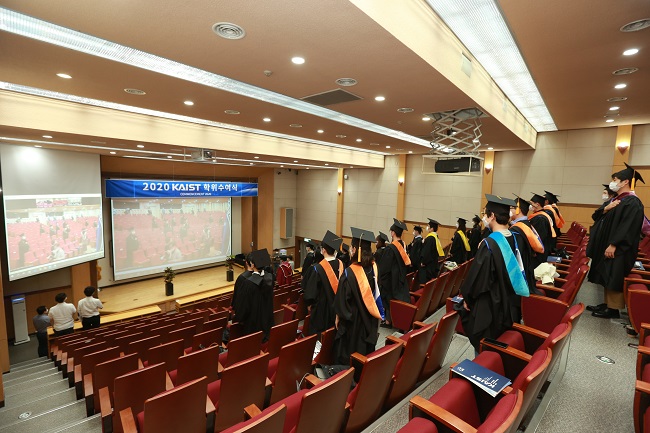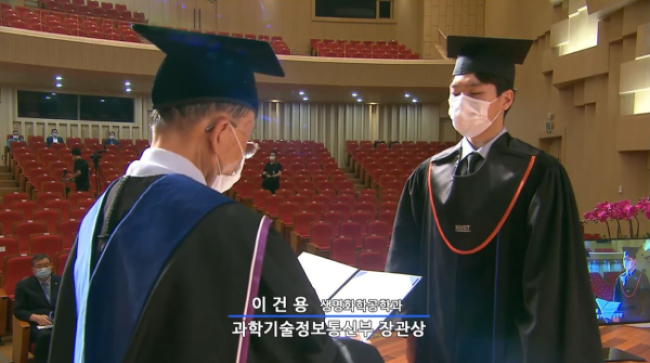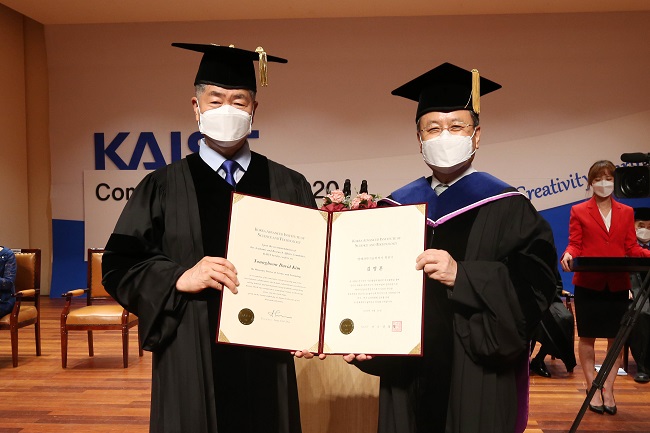event

< Graduates were divided into three groups to attend at three different places and watched the ceremony via Zoom. >
The KAIST community gathered online to celebrate the 2020 graduating class. The blended ceremony conferred their hard-earned degrees on August 28. The belated celebration, which was postponed from February 21 due to the COVID-19 outbreak, honored the 2846 graduates with live streaming on YouTube beginning at 2:00 pm. The graduates include 721 PhDs and 1399 master’s degree holders.
The government raised its social distancing guidelines to level two out of three on August 23 as the second wave of the virus hit the nation. Level two guidelines prohibit the gathering of more than 50 persons indoors or 100 persons outdoors.
For the virtual ceremony, the Office of Student Affairs and Policy announced a list of 67 graduates who signed up to participate in the graduation ceremony. Graduates were divided into three groups to attend at three different places and watch the ceremony via Zoom. No family and friends of the graduates were allowed to participate at the campus.

< Kon-Yong Lee from the Department of Chemical and Biomolecular Engineering, received the Award of Minister of Science and Technology. >
This year’s valedictorian, Kon-Yong Lee from the Department of Chemical and Biomolecular Engineering, received the Award of Minister of Science and Technology. Salutorian Hee-Kwang Roh from the Department of Chemistry received the Award of the KAIST Board of Trustees, while the recipient of the KAIST Presidential Award was Hong Jae-Min from the School of Computing.
President Sung-Chul Shin, Chairman of the Board of Trustees Woo-Sik Kim, former Minister of Science and Technology and former Provost at KAIST Dr. KunMo Chung, and a very limited number of faculty and staff members officiated the commencement ceremony from the KAIST auditorium.
President Shin in his commencement speech applauded the graduates’ hard work and dedication and delivered a very special congratulatory message to them. He encouraged the new graduates to be courageous enough to deal with these new challenges as well as future uncertainties, during the greatest transformation brought about by COVID-19.
“Instead of following behind others as a fast follower, we should take the initiative and walk down new paths as a first mover.” He also stressed, “We can transform this crisis into an opportunity by practicing the C3 values KAIST pursues: Challenging, Creating, and Caring.”
As new alumni of Korea’s top science and technology university, he said, “Our graduates should focus on creating the world’s best, first, or only one in their research or their work.” However, he also pointed out the importance of a caring mind for others when working together.
At the ceremony, KAIST conferred an honorary doctorate degree to Dr. Younghoon David Kim, CEO and Chairman of Daesung Group, in recognition of his lifetime dedication to making innovations in the energy industry.

< KAIST conferred an honorary doctorate degree to Dr. Younghoon David Kim, CEO and Chairman of Daesung Group, in recognition of his lifetime dedication to making innovations in the energy industry. >
Daesung Group is a leading energy company in Korea which manufactures and supplies natural gas for industries and home users. Dr. Kim is committed to making efficient energy sources by advancing cutting-energy sciences and disruptive technologies. He has served as chairman of the World Energy Council since 2016.
In his acceptance speech, Kim stressed the Grand Energy Transition as a new driving force in the future energy industry for maximizing energy efficiency.
“Since energy is the most basic foundation for all industries, improvements in energy efficiency translate into benefits for all related industries in terms of its efficiency and productivity.”
“The Grand Energy Transition is progressing widely and rapidly across the entire value chain of energy production, distribution, and consumption with decarbonization, decentralization, and digitalization serving as its driving force.”
He went on, “We should regard energy efficiency not as the fifth fuel but the first primary fuel.”
(END)
-
research KAIST leads AI-based analysis on drug-drug interactions involving Paxlovid
KAIST (President Kwang Hyung Lee) announced on the 16th that an advanced AI-based drug interaction prediction technology developed by the Distinguished Professor Sang Yup Lee's research team in the Department of Biochemical Engineering that analyzed the interaction between the PaxlovidTM ingredients that are used as COVID-19 treatment and other prescription drugs was published as a thesis. This paper was published in the online edition of 「Proceedings of the National Academy of Sciences of Ameri
2023-03-16 -
research A Mathematical Model Shows High Viral Transmissions Reduce the Progression Rates for Severe Covid-19
The model suggests a clue as to when a pandemic will turn into an endemic A mathematical model demonstrated that high transmission rates among highly vaccinated populations of COVID-19 ultimately reduce the numbers of severe cases. This model suggests a clue as to when this pandemic will turn into an endemic. With the future of the pandemic remaining uncertain, a research team of mathematicians and medical scientists analyzed a mathematical model that may predict how the changing transmissio
2022-02-22 -
research Research Finds Digital Music Streaming Consumption Dropped as a Result of Covid-19 and Lockdowns
Decline in human mobility has stunning consequences for content streaming The Covid-19 pandemic and lockdowns significantly reduced the consumption of audio music streaming in many countries as people turned to video platforms. On average, audio music consumption decreased by 12.5% after the World Health Organization’s (WHO) pandemic declaration in March 2020. Music streaming services were an unlikely area hit hard by the Covid-19 pandemic. New research in Marketing Science found that
2022-02-15 -
fund Seegene Opens Covid-19 Testing Mobile Station on Campus
Seegene donates testing reagents for 40,000 people with results available in three hours Seegene, a molecular diagnostic testing company, donated enough testing reagents for 40,000 COVID-19 tests for the KAIST community and set up a mobile testing station run by the Seegene Medical Foundation on October 28. The entire COVID-19 diagnosis process, including specimen collection, PCR testing, and results analysis, can be conducted at the mobile testing unit developed by Seegene. The on-site tes
2021-11-03 -
event MCM Utilized at Residential Treatment Center in Gyeonggi
The Mobile Clinic Module (MCM) developed by the KAIST Action for Respiratory Epidemics was installed at special residential treatment center in Gyeonggi Province on September 13. The MCM is an isolate negative pressure unit fitted with high-quality medical equipment, developed by Professor Taek-Jin Nam of the Department of Industrial Design under the KAIST New Deal R&D Initiative. This is also a part of the Korean Disease Control Package Development Project from last July. In January, a
2021-09-15